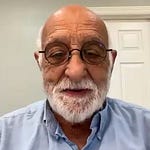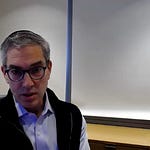In recent months, Abir Elzowidi has been sending me updates from her brother Hossam and his wife, Mariam, who were severely injured in Gaza along with their four children by Israeli bombs and have been displaced ten times since October 7th. They’re trying to raise the money to seek medical care in Egypt. Their GoFundMe page is here.
She sent this note, from Hossam, last week:
As the bombing and bloodshed continue, a haunting question echoes through Gaza:
Whose last night will this be?
How many homes will fall into darkness tonight?
How many names will vanish from the civil registry — lives reduced to memories beneath the rubble and dust?
Every person here lives with the unbearable fear of being next. Nothing feels certain anymore, except this: death walks among us — uninvited, unrelenting.
Oh God, lift this suffering from us. Shield us. Spare us.
Amid this horror, I continue my desperate efforts to secure medical treatment abroad. Next week, we have an important interview with a representative from the Palestinian Ministry of Health, who will review our medical documents and — we hope — approve the paperwork to allow us to travel for care.
But I’m terrified the meeting will be canceled. Hospitals are being bombed. Nothing is safe.
Just days ago, my son, Mumen (16 yrs old), fell from the second floor of our building from the bombing while gathering firewood so we could cook a meal. There is no electricity, no gas — only scraps of wood and a child trying to help his family survive.
Please keep us in your hearts. Please don’t look away.
Hossam
Here again is their GoFundMe page.
Friday Zoom Call
This Friday’s Zoom call, for paid subscribers, will be at our regular time, 1 PM Eastern. Our guests will be the Israeli writer and historian Fania Oz-Salzberger and the Palestinian peace activist Aziz Abu Sarah. Earlier this year they debated on X whether Israel targets Palestinian civilians and how to evaluate Israel’s behavior compared to the behavior of Hamas. Fania and Aziz hold different perspectives about nature of the Israeli state and I’m grateful they’ll discuss these differences on Friday.
Ask Me Anything
Our next Ask Me Anything session, for premium subscribers, will be this Thursday, May 29, from 2-3 PM Eastern time.
Cited in Today’s Video
This video was recorded last week, which is why I called Parsha Emor the most recent Torah portion that Jews had read in synagogue.
Leviticus 22:32 on the desecration of God’s name.
The Babylonian Talmud on why there is no atonement in life for the sin of Chillul Hashem.
Gaza was “unliveable” and an “open-air prison” before October 7, 2023.
Why Gaza has more child amputees than any place on earth.
Israel’s own soldiers admit Gaza is starving.
Muhammad Shehada on the equivalent of four rice cakes per day Israel is allowing to enter Gaza.
Pod Save the World talks to a California surgeon who operated in Gaza.
The NRC poll of genocide scholars about Gaza.
Book Tour
On Tuesday, May 27, I’ll be speaking at the Wheeler Center in Melbourne, Australia.
On June 15, I’ll speaking with Na’amod in London.
Things to Read
(Maybe this should be obvious, but I link to articles and videos I find provocative and significant, not necessarily ones I entirely agree with.)
On the Jewish Currents (subscribe!) podcast, Shaul Magid and Hadas Binyamini discuss Chabad’s growing political extremism.
Ayman Odeh is forced off the Knesset podium for discussing the Nakba.
Miss Rachel plays with Rahaf, from Gaza.
My recent conversation at the Woodstock Jewish Congregation.
Rachel Shabi on how Britain’s Labour Party finally began turning around on Gaza.
See you on Friday,
Transcript
So, last week in synagogue, many Jews, including myself, read the Torah portion called Parsha Emor, which comes from the Book of Leviticus—Vayikra, as Jews call it. And it includes this line: “Do not profane my holy name that I may be sanctified in the midst of the Israelites.” And from this line, the rabbis take this idea of what they call chillul hashem, the desecration of God's name.
And it rests on a remarkable concept. The concept in Jewish tradition is that because God has created a special covenant with the Jewish people. Now, again, it's important to say that it doesn't mean that God doesn't have special covenants and relationships in all kinds of different ways with other people, as understood by their tradition. But in Jewish tradition, there is a particular relationship between the Jewish people and God. And what that means is that by binding God's fate to the fate, to the behavior, of Jews.
That, essentially, what Jews do is a kind of referendum on the nature of God itself, that God's reputation is sullied, is desecrated, when Jews behave badly. And so, when one acts in an immoral way—and obviously the rabbis specify various different ways in which one can commit a chillul hashem—one is actually bringing God Himself into disrepute, which is why this is such a profound sin to the extent that in Tractate Yoma, in the Babylonian Talmud, Rabbi Eleazar ben Azariah says that there is no atonement for the sin of chillul hashem, that other sins can be atoned for, but there is no atonement for the sin of desecrating God's name, of chillul hashem.
And how could what's happening in Gaza possibly not be a chillul hashem, a desecration of God's name, on a magnitude, on a scale, that I simply struggle every day to comprehend, to get my mind around. Let's just start with what Gaza was like before October 7th. Because this is sometimes forgotten now, right? That Gaza was called unlivable by the United Nations before October 7th. My friend, Muhammad Shehada, who grew up in Gaza, said that everybody he knew growing up in Gaza contemplated suicide before October 7th because it was called an open-air prison by Human Rights Watch, because there was unemployment rate of 67%, including for university graduates, because there was very little electricity and little water, and there was no possibility of having a better and decent life.
There was barely any functioning economy. He said that people would get older into their 20s, and they would feel a sense of particular shame on their birthdays, because they would know that they were getting older, and they had no possibility of building a life from themselves. They couldn't move out of their parents' home. He used to say they would joke they couldn't even afford to get married.
This was before October 7th, before Israel had destroyed most of the buildings, and most of the hospitals, and most of the schools, and most of the universities, and most of the bakeries, and most of the agriculture, and forced people in Gaza to move again and again and again and again, and moving them onto smaller and smaller tracts of land inside the Gaza Strip. My friend, Ahmed Moor, who also grew up in Gaza, wrote in The Guardian about the fact that there are now more child amputees in Gaza than any other place on Earth, even though there are only 2 million people in Gaza.
And this was avoidable. That amputations are not necessary in modern medicine if you have the necessary supplies, and doctors can work under reasonable conditions. But they couldn't because of the constant bombing and because of Israel's denial of allowing medical supplies in. And can you imagine, just think for a second what hell it is to be an amputee in Gaza, where you can't get decent follow-up care, where you don't have decent sanitation, where you don't have any of the necessary things that would give you any chance of recovering from any serious wound that, you know, might require multiple, multiple surgeries in a place like the United States.
There's this interview with a trauma surgeon from Stockton, California, in Pod Save the World, where he talks about—God bless him, he went to Gaza to work twice in these hospitals—he said people would regularly walk in with wounds that had maggots in them. They were so deeply infected. He said in the hospitals where he worked, every single medical worker he met—these are just medical workers—every single medical worker he met expects to die, and expects their family to die.
The New York Times reported that even Israeli military officials privately acknowledged that Gaza was on the brink of starvation. And then under pressure, Israel has now allowed in an amount of aid per day that Muhammad Shehada, my friend, estimates is equivalent of 4 rice crackers per day, per person. Four rice crackers per day, per person, after allowing no humanitarian aid in for 2 months, right?
And in mainstream Jewish circles and political circles, people get extremely angry if you suggest that this could constitute genocide. But the Dutch newspaper NRC basically just went out, they looked at academic articles published in the Journal of Genocide Research, right, this top scholarly journal. And they just asked all these people who had been publishing on the subject of genocide, the world's leading genocide scholars, several of them Israeli, do you consider this genocide? Do you think there are any serious scholars at this point who don't consider this genocide? Unanimously, unanimously, these scholars, including Israeli and Israeli-born scholars, said they believe this constitutes genocide.
In Jewish tradition, there is no atonement for a chillul hashem of this magnitude. This will haunt the United States because we provided the arms, all other governments that were complicit in this, and us as a people, for the rest of our lives. We will be living in the moral and spiritual wreckage of this. And I don't understand, really, I genuinely struggle to understand when I think about Jewish leadership, when I think about all of these rabbis, when I think about all of these politicians and communal leaders. Do they really not understand this? Do they really not understand that for the rest of all of our lives, we are going to be haunted by this, and we're going to be called to account. People are going to have to answer for what's being done to the people of Gaza.
There is no atonement. There is no atonement in Jewish tradition for a chillul hashem of this magnitude. That doesn't mean there's nothing that people can do. There is an urgent, urgent need to stop sending Israel the weapons that are being used to kill and starve all of these people, and an urgent need to allow the processes of international justice to take place so people are held to account. And people in Hamas should also be held to account for the massacres that Hamas committed on October 7th. I'm also glad that they have been indicted for war crimes, as with Benjamin Netanyahu and Yoav Gallant and others.
But this is the minimum. But this is the minimum. This is going to be, I think for the Jewish people, for us, a spiritual crisis, not just a moral crisis. But if we take Judaism seriously, a spiritual crisis that will be the greatest spiritual crisis of most of our lives. It will be the greatest spiritual crisis that the Jewish people have faced since the Holocaust. It will be, of course, a spiritual crisis of a massively different order, and that's not to say that what's happening in Gaza is the equivalent of the Nazi Holocaust. Of course not. But it will be a radically different kind of spiritual crisis, because the question will not be, where was God when Jews were being slaughtered—6 million of them—but where were we when we desecrated God's name by allowing in our name—and in the United States, with our weapons—this kind of horror to take place day after day after day after day. And the band played on. We will not move past this as a people. We will not move past this. This will shadow us for the rest of our lives.








